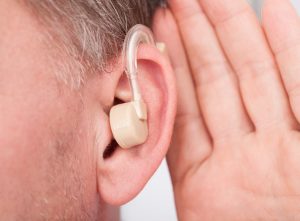
The participants listened to two spoken numbers and had to press a button if the second number said was higher or lower than the first. The numbers were presented with background noise.
During the hearing test, the researchers manipulated the acoustic quality by removing certain frequencies from the speech signal. Research lead Malte Wöstmann said, “The voices then sound like artificially generated computer speech.”
The researchers also intentionally varied the predictability, meaning if the first number was very low there was a greater probability the second number was higher. With better predictability, participants were quicker at the activity, but the results changed once the acoustic quality altered. Older participants fared well with better acoustic quality.
The effect of acoustic quality for older participants was also reflected in the alpha waves. With improved speech quality, the alpha wave amplitude was much lower for older study subjects, implying that attention in elderly shifts to acoustic aspects of the speech signal.
Wöstmann concluded, “I am thinking here, for example, of the possibility of adapting hearing aids to the listener’s brain activity individually and dynamically in order to improve speech comprehension in challenging situations.”
Preventive tips for older adults with hearing loss
If you’re over the age of 50, you don’t have to fall victim to losing your hearing. There are easy preventative measures you can try to ensure you preserve your hearing and avoid the side effects hearing loss can cause. Here’s what you can do for hearing loss prevention:
- Become aware of hazardous noise and take action to protect your ears – sporting events, concerts, and firecrackers all generate loud and dangerous sounds. If you are attending an event that you know will be noisy, ensure you wear protective gear like ear plugs, or distance yourself from the source of the noise.
- If you work at a noisy job site, ensure you always wear protective equipment over your ears and avoid prolonged exposure to loud sounds.
- Keep volumes on TV, radio, or other devices to a moderate level – especially if you are using headphones. The closer the sound, the lower the volume should be.
- Buy appliances and products that generate less noise.
- Go for routine hearing check-ups, especially the older you get.
The Better Hearing Institute suggests that one third of hearing loss can be avoided with prevention strategies. Even if you think it’s too late or you’re too old, following these tips can help you preserve your hearing for many more years to come.